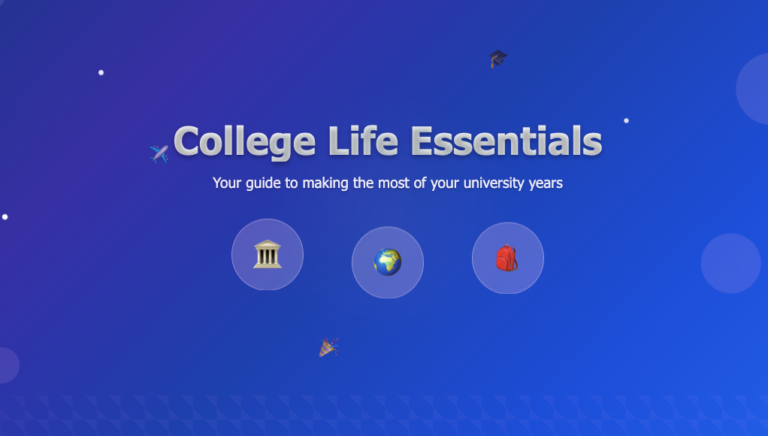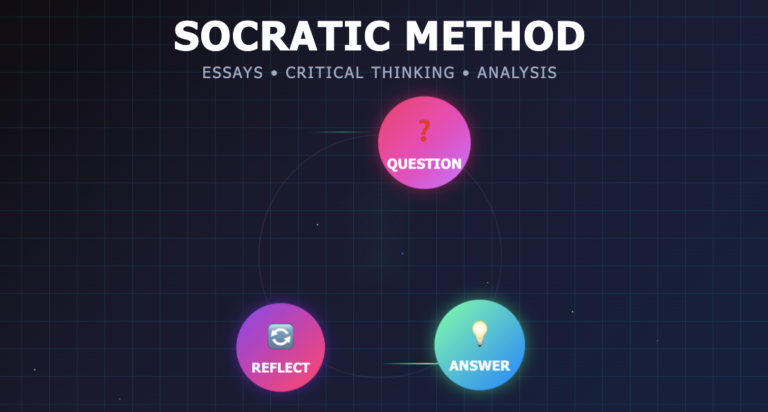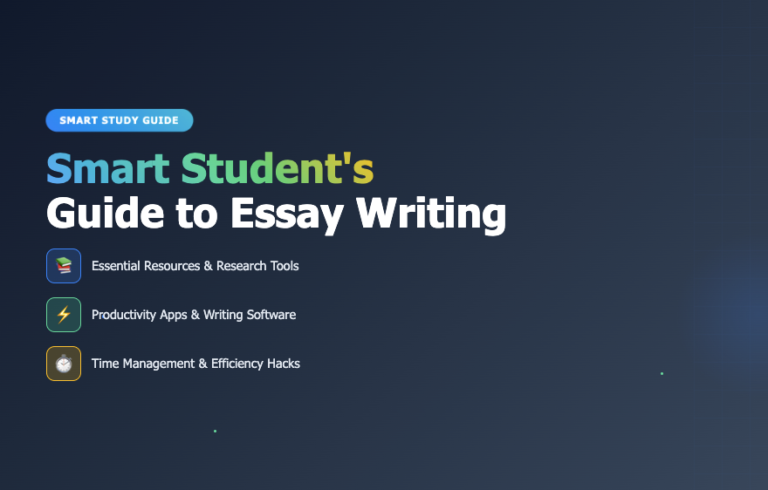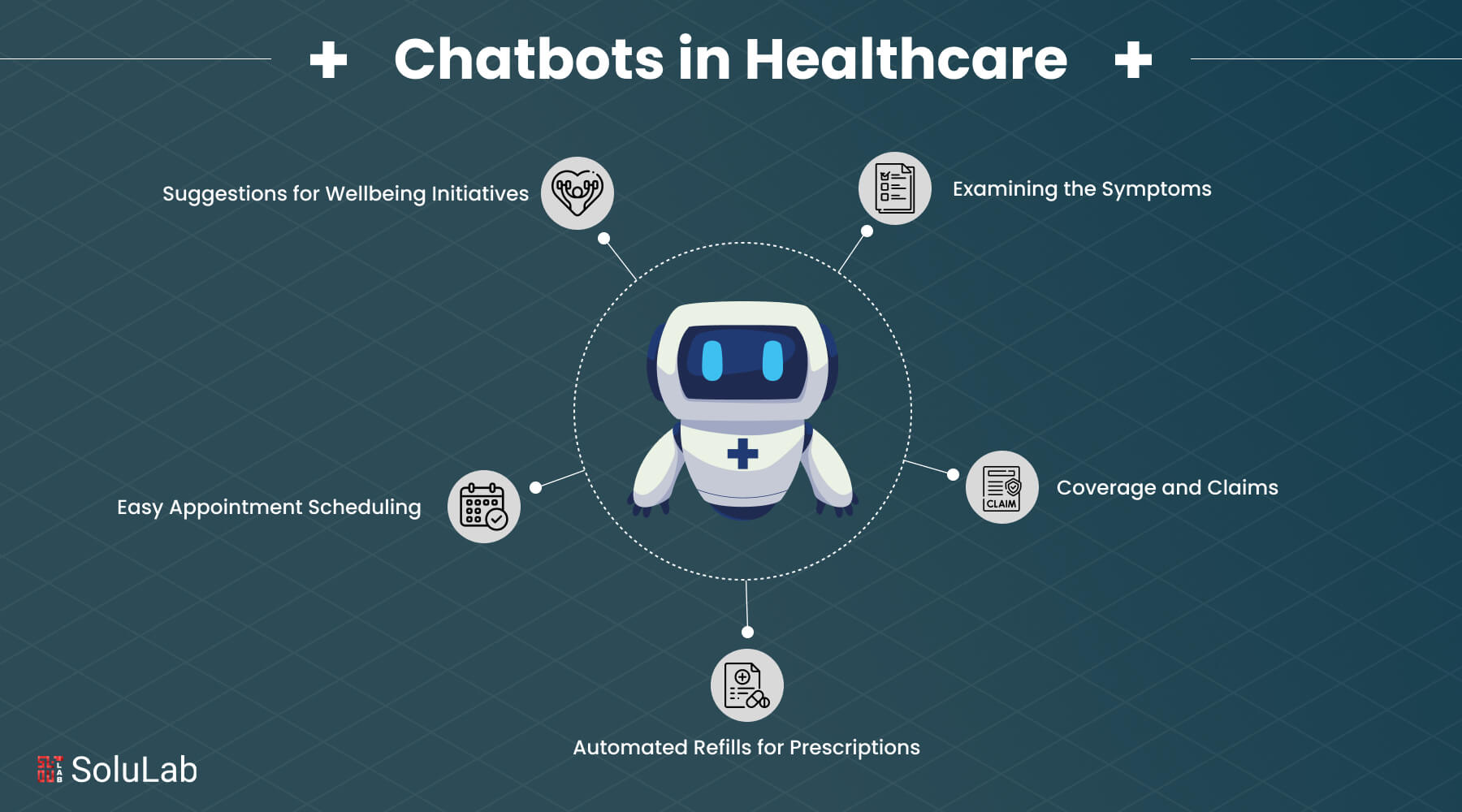
Artificial Intelligence has quickly become a major force in several sectors. The healthcare sector is no exception. Healthcare practitioners are using AI to help patients all the time. With the aid of a medical chatbot, patients may obtain the necessary information whenever they need it and benefit from improved healthcare.
Chatbots in the healthcare sector save professionals a ton of time by automating all of a medical representative’s mundane and lower-level tasks. But that’s not the case. They collect and track patient information, ensure it’s encrypted, allow for patient monitoring, provide a range of educational resources, and assure more extensive medical assistance. In general, healthcare chatbots are revolutionizing the medical field.
AI chatbot in healthcare use will continue to rise as more companies realize how beneficial it is to automate their processes. The market for healthcare chatbots is expected to grow from $230.28 million in 2023 to $944.65 million by 2032. Let’s learn more about chatbots’ applications and advantages in the medical field.
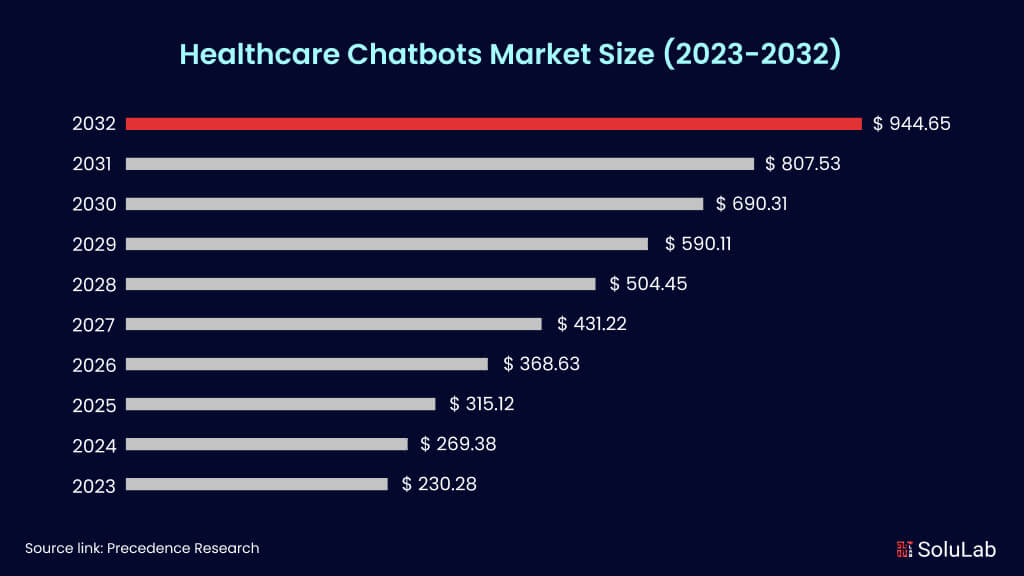
Talking about AI chatbots in healthcare, SoluLab recently worked with blockchain in pharma which deals with the drug supply chain. In this innovative case study, we have shown how SoluLab led the way in creating a Certifying Authority System that transformed identity management in the healthcare industry. Our approach involved utilizing smart contracts and blockchain technology to guarantee the validity and traceability of pharmaceutical items from the point of origin to the final consumer. In the end, this open and efficient approach improves patient safety and confidence in the healthcare supply chain by streamlining cross-border transactions and protecting against counterfeit medications. With its modern methodology, SoluLab continues to demonstrate its dedication to advancing revolutionary healthcare solutions and opening the door for a more transparent and safe industrial ecosystem.
What are Healthcare Chatbots?
The future of virtual customer service, planning, and management in the healthcare industry will be shaped by chatbots. An automated tool created to mimic a thoughtful dialogue with human users is called a chatbot.
AI-driven healthcare chatbots may easily respond to basic questions and offer consumers a quick method to look up information. Compared to using an outsourced contact center or reading a website, these self-service options frequently offer a more intimate means of connecting with healthcare services. In fact, 86% of consumers say they would prefer to speak with a chatbot than complete a form on a website, according to Forbes. The healthcare sector is no exception.
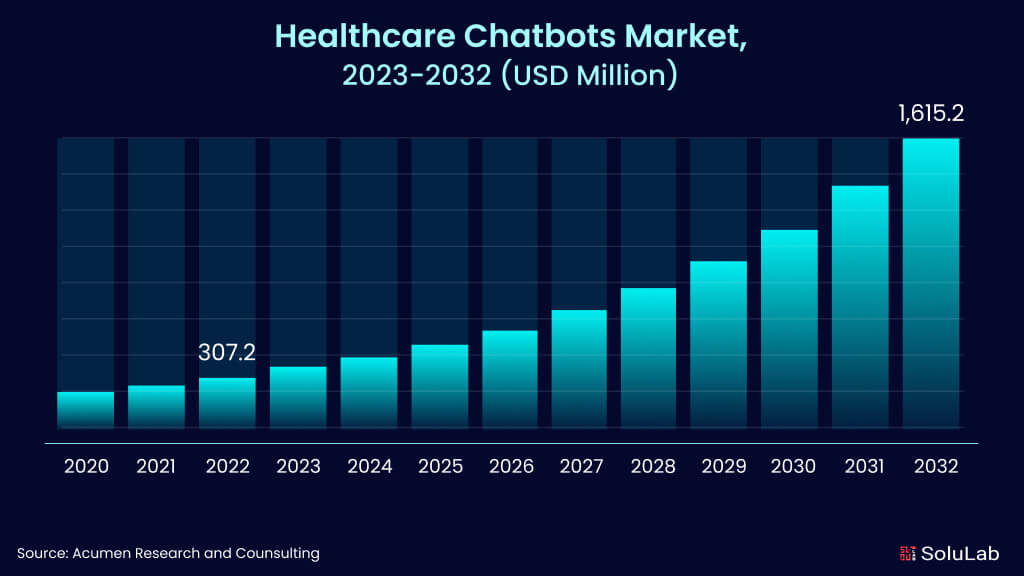
Healthcare Chatbot and Its Purpose
An advanced fusion of AI and medical knowledge, the healthcare chatbot is intended to transform administrative and patient care duties. Fundamentally, a chatbot in healthcare is a software program driven by artificial intelligence that communicates with consumers in real-time via voice or text. Through the utilization of sophisticated natural language processing and machine learning skills, these chatbots can understand, interpret, and react to patient inquiries with exceptional precision and effectiveness.
Simplifying interactions between healthcare and patient practitioners is the main function of the healthcare chatbot. They act as 24-hour digital assistants that can do a variety of duties, such as reminding patients to take their medication and giving them personalized health advice, in addition to answering frequently asked questions about health and making appointments. Improving patient participation continues availability greatly lessons. This training is for medical staff. Healthcare, chatbot, help healthcare workers, save time by automating, repeated queries and administrative duties, and bringing them up to concentrate more on patient interaction and vital treatment.
Types of Chatbots in Healthcare
Healthcare chatbots that are conversational, informative, and prescriptive can be separate applications or integrated into messaging platforms like Whatsapp, Facebook Messenger, and Telegram. These characteristics set each variety apart.
1. Informative Chatbots
This kind of chatbot software uses pop-ups to give consumers guidance and information help. The least invasive method is to use informative chatbots, which gradually introduce patients to the medical information base. They are therefore frequently the go-to chatbot for services like addiction treatment or mental health help.
The most basic AI algorithms are built into these chatbots, and their purpose is to disseminate information through pre-programmed answers.
2. Conversational Chatbots
Because these health chatbots can respond to particular queries, they are more suited to handle patients’ issues.
NLP is a subtype of machine learning (ML) techniques that is used by sophisticated conversational bots. Before they are released, they must be taught to process speech in an efficient manner. As they engage with more users, more sophisticated applications will keep learning.
3. Prescriptive Chatbots
These bots go above and beyond, as their name implies. Prescriptive chatbots provide real medical recommendations based on the user’s input in addition to responding to the patient’s inquiries. The program has to use NLP techniques and have the most recent knowledge base in order to achieve it.
The ethical restraints that apply while consulting on delicate subjects are an additional important consideration.
Benefits of Chatbots in Healthcare
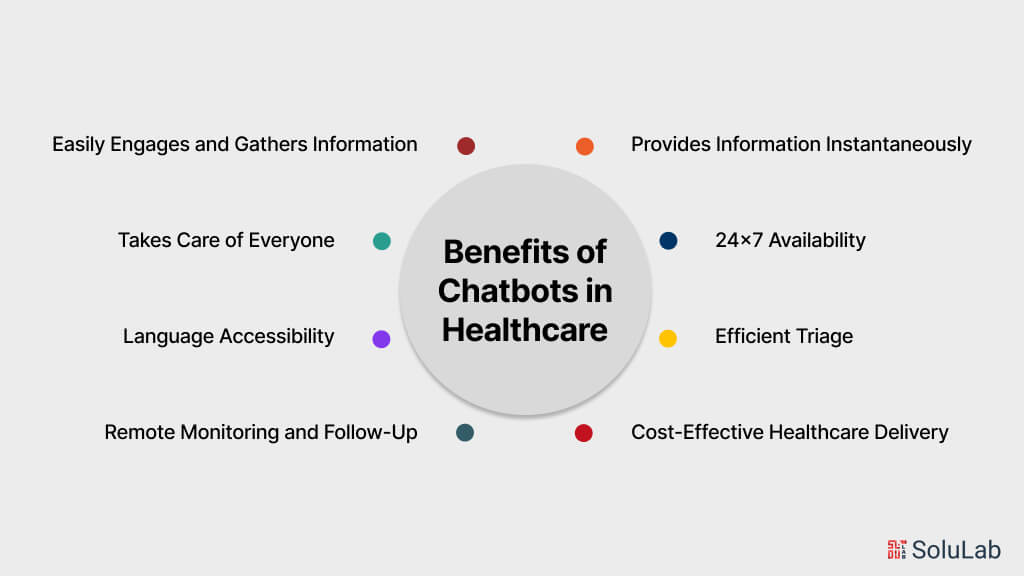
The healthcare sector has benefited greatly from the deployment of chatbots in many different ways. These are a few noteworthy benefits of healthcare chatbots.
1. 24×7 Availability
Medical professionals might not always be able to handle everything. Emergencies may occur at any time and require immediate medical attention. At any point, patients may want help with anything from identifying symptoms to planning procedures. This is when chatbots come in handy. They are always available to anybody.
2. Easily Engages and Gathers Information
Empathy is a major component of healthcare. Medical chatbots elicit information from users through probing, which is then utilized to customize the patient’s experience and improve company procedures going forward. At the same time, a website might not be able to respond to every query on its own, but an intuitive chatbot can address more inquiries and provide a human touch.
3. Takes Care of Everyone
Healthcare providers are the only ones who can offer one-on-one care. Thus, their range is limited. On the other hand, several customers can be assisted and engaged by medical chatbots simultaneously without compromising the quality of interaction or information provided. Patients may speak with healthcare experts using chatbots in the same way that they would through traditional means including emails, texts, video calls, and phone conversations. This increases patient participation and gives medical staff more time and opportunity to focus on patients who require more care.
4. Provides Information Instantaneously
In the medical domain, time is of the essence. In the healthcare sector, chatbots quickly provide helpful information when every second matters. For example, if a patient flees during an assault, chatbot technology in healthcare can quickly provide the physician with information on the patient’s medical history, allergies, ailments, check-ups, and other issues.
5. Efficient Triage
Chatbots excel at symptom assessment and triage, directing patients to appropriate resources, or recommending the urgency of seeking medical attention. They help streamline the healthcare process by prioritizing cases based on severity, optimizing resource allocation, and reducing wait times. Efficient triage by chatbots ensures that patients receive timely care, leading to better health outcomes and satisfaction. By automating the initial assessment process, healthcare providers can focus their attention on patients requiring immediate intervention, improving overall efficiency.
6. Cost-Effective Healthcare Delivery
Chatbots help healthcare providers deliver cost-effective care by automating routine tasks and optimizing resource utilization. The efficient use of chatbots reduces operational costs and administrative overhead for healthcare organizations. By improving healthcare efficiency, chatbots contribute to cost savings while maintaining quality standards in patient care. Cost-effective healthcare delivery facilitated by chatbots ensures that resources are allocated efficiently, maximizing value for both patients and providers.
Read Blog: Generative AI in Healthcare
7. Language Accessibility
Chatbots overcome language barriers by providing multilingual support, ensuring that healthcare information is accessible to diverse patient populations. Patients appreciate the ability to communicate with chatbots in their preferred language, enhancing their understanding of medical advice and instructions. Language accessibility improves patient engagement and satisfaction, leading to better health outcomes and adherence to treatment plans. By offering language support, chatbots promote inclusivity in healthcare delivery, addressing the needs of multicultural communities.
8. Remote Monitoring and Follow-Up
Chatbots enable remote monitoring of patient’s health conditions, facilitating proactive intervention and timely follow-up care. Patients appreciate the convenience of remote monitoring, which allows them to receive care without visiting healthcare facilities. Remote follow-up through chatbots improves care continuity and patient outcomes, particularly for chronic disease management. By supporting remote healthcare delivery, chatbots contribute to improved access to care, especially for patients in remote or underserved areas.
Chatbot’s Contribution to Improving Healthcare
By encouraging the use of self-service choices, digital technology has reshaped a number of businesses. Consumers now anticipate easy and independent interactions with companies, particularly when it comes to standard functions like updating personal information. Here are some ways in which chatbots driven by AI are enhancing healthcare:
- Providing Real-Time Assistance: Patients receive real-time support from digital AI chat agents, which guarantee prompt answers to any questions or concerns. By delivering prompt responses for standard tasks like making appointments, verifying tests, and conclusions, or giving general information, they remove delays.
- Simply Administration Processes: Chatbots eliminate the requirement of back-and-forth communication by automating repetitive administrative duties. For instance, they handle scheduling, cancellations, and appointment scheduling without the need for human participation, freeing up employees to work on more important tasks.
- Better Patient Experiences: Patients no longer need to wait for a response or continuously confirm their personal information. AI, and chatbot process and handle this data safely, making the user experience easier and more intuitive.
- Effective Human Personnel Transfer: chatbots can easily direct patients to the right medical specialist when delicate or complicated concerns come up. Additionally, they give employees access to all pertinent background, data, facilitating quicker and better problem-solving.
- Preserving Privacy: Sophisticated chatbots are made to adhere to local healthcare laws, and guarantee the safe and private handling of private patient information. This facilitates the introduction of self-service tools while fostering trust.
- Promote Preventive Care: Chatbots can help with proactive care management by tracking patient, health, data, sending prescriptions, reminders, and monitoring symptoms. This announces long-term health results and lowers the chance of problems.
Use Cases of Chatbots in Healthcare
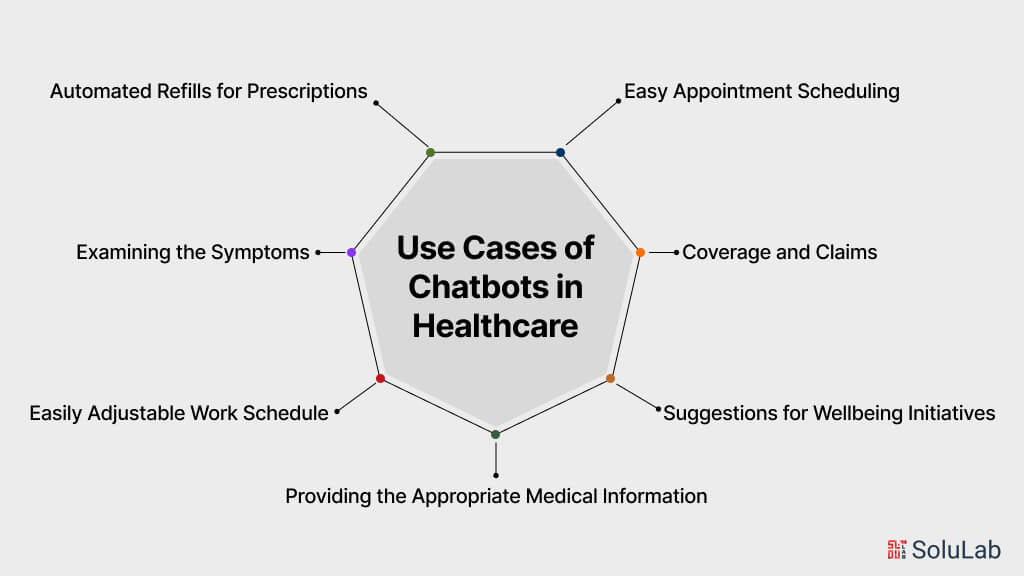
It’s time to look into the numerous Artificial Intelligence (AI) chatbots use in healthcare now that you are aware of the benefits of chatbots for the industry.
These are some ways that chatbots are changing the healthcare industry.
1. Easy Appointment Scheduling
Making appointments is one of the jobs that is done in the healthcare industry the most frequently. However, owing to issues like sluggish apps, multilayered information requirements, and other issues, many patients find it difficult to utilize an application for making an appointment.
Patients frequently decide to cancel or even permanently switch healthcare providers when they encounter lengthy wait times. One excellent way to address the issue is through the employment of chatbots in the healthcare industry. A chatbot may be easily accessed by users of a website or app by sending a message.
Appointments can be scheduled by a well-built healthcare chatbot according to the doctor’s availability. In order to help medical personnel maintain records of patient visits and follow-up appointments while preserving the data for later use, chatbots may also be built to interact with CRM systems. An AI healthcare chatbot can collect and handle co-payments to expedite the process even further.
2. Providing the Appropriate Medical Information
Chatbot algorithms are trained using vast amounts of healthcare data, which include illness symptoms, diagnosis, signs, and possible treatments. Public datasets like COVIDx for COVID-19 diagnosis and Wisconsin Breast Cancer Diagnosis are frequently used to train chatbots for the healthcare industry (WBCD).
Differentially intelligent conversational AI chatbots in healthcare may be able to understand customer inquiries as a consequence of this training and react based on predetermined labels in the training data.
With the use of these chatbots, one may simply obtain a diagnosis that is almost exact by entering in a small amount of information, saving time and the inconvenience associated with visiting the clinic or doctor.
3. Examining the Symptoms
Chatbots are presently being used more and more to analyze a patient’s symptoms and check their medical status without requiring them to visit a hospital. NLP-based chatbot development can assist in interpreting a patient’s request regardless of the range of inputs. NLP can assist in achieving more accuracy in replies while assessing the symptoms.
According to the pre-fetched inputs, the chatbots can utilize the information to help the patients diagnose the ailment causing their symptoms. With an interactive bot and the data it gives, the patient may determine the appropriate amount of treatments and drugs.
4. Coverage and Claims
Chatbots can be trained to assist patients in filing insurance claims. Thus, whether a patient wants to check the status of a claim, register a claim, or confirm their existing coverage, a healthcare chatbot may provide them with a simple method to get the information they need.
Furthermore, because it gives them instant access to patient data and inquiries, this facilitates physicians’ pre-authorization of billing payments and other requirements from patients or healthcare authorities.
5. Automated Refills for Prescriptions
One of the finest uses of chatbots in healthcare is automating prescription refills. Many people waste weeks waiting to fill their prescriptions since most doctor’s offices have an excessive amount of paperwork, which takes up crucial time. Alternatively, the chatbot can make inquiries with each pharmacy to verify if the prescription has been filled, and then notify the user when the item is prepared for delivery or pickup.
This lets doctors focus on their patients instead of completing tedious chores like phoning pharmacies and waiting for a response. It also helps patients keep informed about their upcoming medical visits and prevents them from forgetting to take any dosages or being confused about what to take when they see the doctor again.
Read Oure Blog: AI Use Cases and Applications in Key Industries
6. Suggestions for Wellbeing Initiatives
One of the key tenets of the healthcare industry is growing enrollment. The best option available to healthcare institutions to raise awareness and enhance program enrollment is medical chatbots.
A well-crafted healthcare chatbot with natural language processing (NLP) can understand user intent through sentiment analysis. The bot’s interpretation of human input allows it to recommend appropriate healthcare plans.
7. Easily Adjustable Work Schedule
Any business might first demand the capacity to grow the support, especially those in the healthcare industry.
If you had the same support system in place, how would you handle rush hour traffic when it suddenly increases?
The result will be challenges such as training sessions and employing more medical specialists. By incorporating a healthcare chatbot into your customer service, you can solve problems and offer the scalability to manage conversations in real-time.
Chatbots for customer support in the healthcare industry can boost business efficiency without hiring more workers or incurring more expenses.
What Does Healthcare Chatbot Future Hold?
We may encounter opposition to experimenting with more complicated use cases even if the market is saturated with a wide range of chatbots for the healthcare industry. It’s partly because there is still a long way to go and conversational AI in healthcare is still in its infancy. Artificial intelligence will improve and more advanced chatbot medical assistant solutions will become available as natural language comprehension technology advances.
Medical chatbots will certainly become more accurate, but it won’t be sufficient to guarantee their effective adoption in the healthcare sector. Similar to how empathy and therapies coexist in the healthcare sector, a comparable equilibrium will need to be established for chatbots to gain traction and acceptance.
But in the years to come, it’s expected that medical robots will meet up to these expectations:
- In times of need, they will automatically request assistance, offer patients continual company, and check their health in real-time.
- They will support the treatment of chronic diseases, psychological and behavioral disorders, and mental health issues.
- They will proactively detect symptoms, cross-reference patients with a medical history, suggest the next course of action and increase the success rate of therapy in circumstances when early diagnosis is critical.
- They might make self-care easier by acting as a virtual assistant and providing timely medical advice.
How Will Chatbots be Used in Healthcare in the Future?
Healthcare chatbots are expected to play a key role in the impending major transformation of the healthcare sector. These AI-powered assistants have a promising and diverse future that will transform healthcare delivery and patient experiences. Here is a look at what healthcare chatbots may look like in the future:
- Advanced Medical Monitoring and Assistance: It is anticipated that healthcare chatbots will soon develop into intelligent patient companions that provide automated emergency assistance and real-time health monitoring. Their ability to monitor health status continually and react quickly to emergencies will be transformational, particularly for individuals who require ongoing care or our managing chronic conditions.
- Improved Behavior and Mental Health Management: Chatbots will be essential in the treatment of behavioral disorders and mental health conditions. This chatbot will offer sympathetic assistance and practical management techniques. Due to the development of NLP and AI, patients can more easily and discreetly traverse difficult mental health issues.
- Early Diagnosis: Proactive care is also key to the future of healthcare chatbots. Treatment success rates will be greatly increased as a result of their ability to recognize symptoms early, compare them to patients’ medical histories, and suggest the best course of action. This proactive strategy will be especially helpful for disorders where effective treatment depends on early detection.
Final Words
In wrapping up, it’s clear that chatbots have made a significant impact on the healthcare industry. They’ve revolutionized how patients access care and how healthcare providers manage administrative tasks. From offering round-the-clock assistance to delivering personalized health education, chatbots have become invaluable tools in modern healthcare.
At SoluLab, we’re committed to driving innovation in healthcare through AI development services like the Mental Health Platform the chatbot has offered easily accessible and customized mental health assistance services to people from a range of demographics. People have benefited from real-time support through the ChatGPT model of the chatbot, which evaluates their psychological needs and offers customized resources and advice. Through the availability of pertinent information and suggestions, the libraries, instructional materials, and self-help tools have empowered people to take charge of their mental health outcomes. Even people with a low level of computer literacy now receive behavioral support services with the help of this chatbot’s accessibility.
FAQs
1. Can doctors be replaced by chatbots?
AI chatbots can be a helpful addition to healthcare, but they cannot take up the role of doctors. Doctors are more knowledgeable, and experienced, and have better interpersonal skills than chatbots.
2. Are chatbots secure for handling sensitive medical information?
Yes, reputable healthcare chatbots prioritize data security and comply with industry regulations like HIPAA (Health Insurance Portability and Accountability Act) in the United States. They utilize encryption protocols, secure servers, and stringent access controls to safeguard patients’ sensitive medical information. Additionally, they undergo regular security audits to ensure compliance and mitigate any potential risks.
3. How accurate are healthcare chatbots in providing medical advice?
Healthcare chatbots vary in accuracy depending on their design, training data, and underlying algorithms. While they excel in providing general health information and guidance for common ailments, they may not replace the expertise of healthcare professionals for complex diagnoses or treatment plans. However, when you hire AI developers with expertise in natural language processing and machine learning, chatbots continue to improve in accuracy and reliability, enhancing their utility in healthcare settings.
4. Can chatbots improve patient engagement and adherence to treatment plans?
Yes, chatbots play a significant role in enhancing patient engagement and adherence to treatment plans. They offer personalized reminders for medication intake, follow-up appointments, and lifestyle modifications, which help patients stay on track with their healthcare regimens. Moreover, chatbots engage patients in interactive conversations, answering their queries promptly and providing continuous support, thereby fostering a stronger patient-provider relationship and improving overall health outcomes.
5. How to build a medical chatbot?
Start by describing the problems and the solution you’re attempting to achieve. For your medical chatbot, pick a platform and create the flow of the conversation. Create the medical chatbot, and test it to refine the operations.



